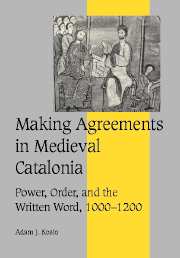Book contents
- Frontmatter
- Contents
- List of figures
- List of tables
- Acknowledgments
- Note on citations, dates, and names
- List of abbreviations
- Map
- INTRODUCTION
- 1 THE FIRST CONVENIENTIA: SOCIAL AND DOCUMENTARY CHANGE AROUND THE YEAR 1000
- 2 MAKING AGREEMENTS
- 3 KEEPING AGREEMENTS
- 4 FOUNDATIONS (THE ELEVENTH CENTURY)
- 5 FORTUNES (THE TWELFTH CENTURY)
- 6 WRITING AND POWER
- Table of published documents
- Works cited
- Index of names
- Subject index
- Cambridge Studies in Medieval Life and Thought Fourth series
1 - THE FIRST CONVENIENTIA: SOCIAL AND DOCUMENTARY CHANGE AROUND THE YEAR 1000
Published online by Cambridge University Press: 09 July 2009
- Frontmatter
- Contents
- List of figures
- List of tables
- Acknowledgments
- Note on citations, dates, and names
- List of abbreviations
- Map
- INTRODUCTION
- 1 THE FIRST CONVENIENTIA: SOCIAL AND DOCUMENTARY CHANGE AROUND THE YEAR 1000
- 2 MAKING AGREEMENTS
- 3 KEEPING AGREEMENTS
- 4 FOUNDATIONS (THE ELEVENTH CENTURY)
- 5 FORTUNES (THE TWELFTH CENTURY)
- 6 WRITING AND POWER
- Table of published documents
- Works cited
- Index of names
- Subject index
- Cambridge Studies in Medieval Life and Thought Fourth series
Summary
Around the year 1021, the young counts of Barcelona and Urgell, Berenguer Ramon I and Ermengol II, met, held negotiations, and concluded an agreement. They made promises to each other concerning the granting and holding of castles, oaths of fidelity, guarantees, and procedures for the resolution of conflicts. The record of this agreement is the earliest surviving convenientia from the Catalan counties. The complexity of the document suggests that it was not the first such agreement of its kind, nor the first to be written down. This very complexity and the prominence of the participants, however, make the agreement a useful symbol of a social and documentary transformation in the region. It provides a touchstone for an examination of the context in which the convenientia emerged, an examination that demonstrates the links between changes in documents and changes in institutions.
The exemplar of this first surviving convenientia, which appears to be an original, is striking both for its size and its length: at 2,500 words it is among the longest eleventh-century records in the comital archive. It is the form and substance of the agreement, however, that are most worthy of attention. While most charters from this period serve principally to record the actions of one party to a transaction (e.g., “I sell to you …”; “I grant to you …”), this document indicates in a balanced fashion the acts and responsibilities of both parties. The agreement has three main sections.
- Type
- Chapter
- Information
- Making Agreements in Medieval CataloniaPower, Order, and the Written Word, 1000–1200, pp. 26 - 77Publisher: Cambridge University PressPrint publication year: 2001

